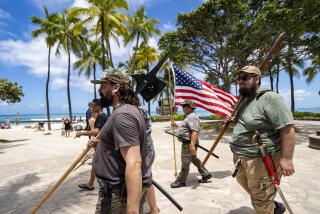Hawaiian Expatriates Still Crave a Bit of Home
- Share via
SANTA CLARA, Calif. — They fingered leis of fresh green leaves spiked with pink orchids, savored kalua pork at the luau and swayed to the strumming of the ukulele.
Maui? No, Northern California.
The 1990s brought waves of people who grew up in Hawaii to the mainland. Like those at a recent music and culture festival in Santa Clara, many try to keep in touch with their Hawaiian heritage--both in concrete ways and at a deeper level.
“We’ll always be Hawaiian. That’s our home, no matter where we are,” said Tony Kwak, who was born in Oahu and now lives in Van Nuys. “It’s a state of mind.”
While Hawaii looks like paradise to many Americans, census estimates say 99,371 more people moved out of the state than moved in from other states from 1990 to 1999. (Hawaii’s overall population edged up from 1.1 million to 1.2 million, however, partly because of the birth rate and international immigration.)
Among those who left, some wanted to escape an economic slowdown. Others were searching for a lower cost of living. Still others just wanted a change. The Hawaiian Islands may be beautiful, but they’re all by themselves.
“You’re just isolated. Wherever you look is the Pacific Ocean,” said Francis Li, 26, who moved to Northern California from Honolulu almost three years ago, and attended the Santa Clara festival. “I wanted to see something more than just Hawaii.”
Other transplants from Hawaii feel the same way. But whether they’re eating poi bagels in Central Park or giving hula lessons in Minnesota, they also want to keep part of their home state with them.
“When you get homesick, you want to experience stuff from home,” said Victor Lee, 26, who moved to San Jose from Oahu about nine months ago in search of a technology job. “You don’t get to eat food like this” away from Hawaii, he said, devouring lomi salmon.
Others say they, too, miss Hawaii’s traditional foods and relaxed attitude. What they miss most, however, is an intangible “Aloha spirit.”
Kwak and another friend from Oahu, Izzie Ramos, launched the AlohaWorld Web site a few years ago as a home-away-from-home for Hawaiians outside Hawaii. The site averages about 70,000 visitors a month, he said.
“There are many, many of us who have moved away from Hawaii,” said Kwak, an Internet technology professional.
In Northern California, those craving the company of other ex-Hawaiians also congregate at happy hour get-togethers.
Two years ago, Dave Kozuki organized the first pau hana, a Hawaiian term that loosely translates to “finish work.” The list of people who receive invitations to the events has grown to 1,800.
“It’s really good to be around people from Hawaii. You can relate,” said Kozuki, who came to the Bay Area from Oahu about two years ago to pursue a career in Silicon Valley. “Some people like to relax and talk pidgin,” an informal blend of languages, including English, Hawaiian, Chinese and Japanese. “It’s a lot more laid-back.”
Across the country, other former Hawaii residents have found ways of staying connected to their culture.
In New York, the Hawaii Cultural Foundation has held hula workshops and ukulele classes, and hosted Hawaiian storytellers and spiritual healers since 1997.
In Seattle, Bill Nahalea hosts a new cable television show devoted to Hawaii’s news, history, music, culture, weather and sports.
And in Las Vegas, Diane Ohata-Sims started the Aloha Pacific Festival five years ago so her daughter, Kanani, 15, and son, Gerald, 33, wouldn’t lose touch with their Hawaiian heritage.
“The only way to keep it alive is to instill in the young people the values and the traditions,” Oahu-born Ohata-Sims said.
Many say they’d like to go back one day. “I’m a laid-back kind of person. I don’t like the fast-paced life of the city,” said Aaron Uyehara, 26, of Campbell, Calif. “I consider Hawaii home and I like to try to keep my ties.”
More to Read
Sign up for The Wild
We’ll help you find the best places to hike, bike and run, as well as the perfect silent spots for meditation and yoga.
You may occasionally receive promotional content from the Los Angeles Times.






